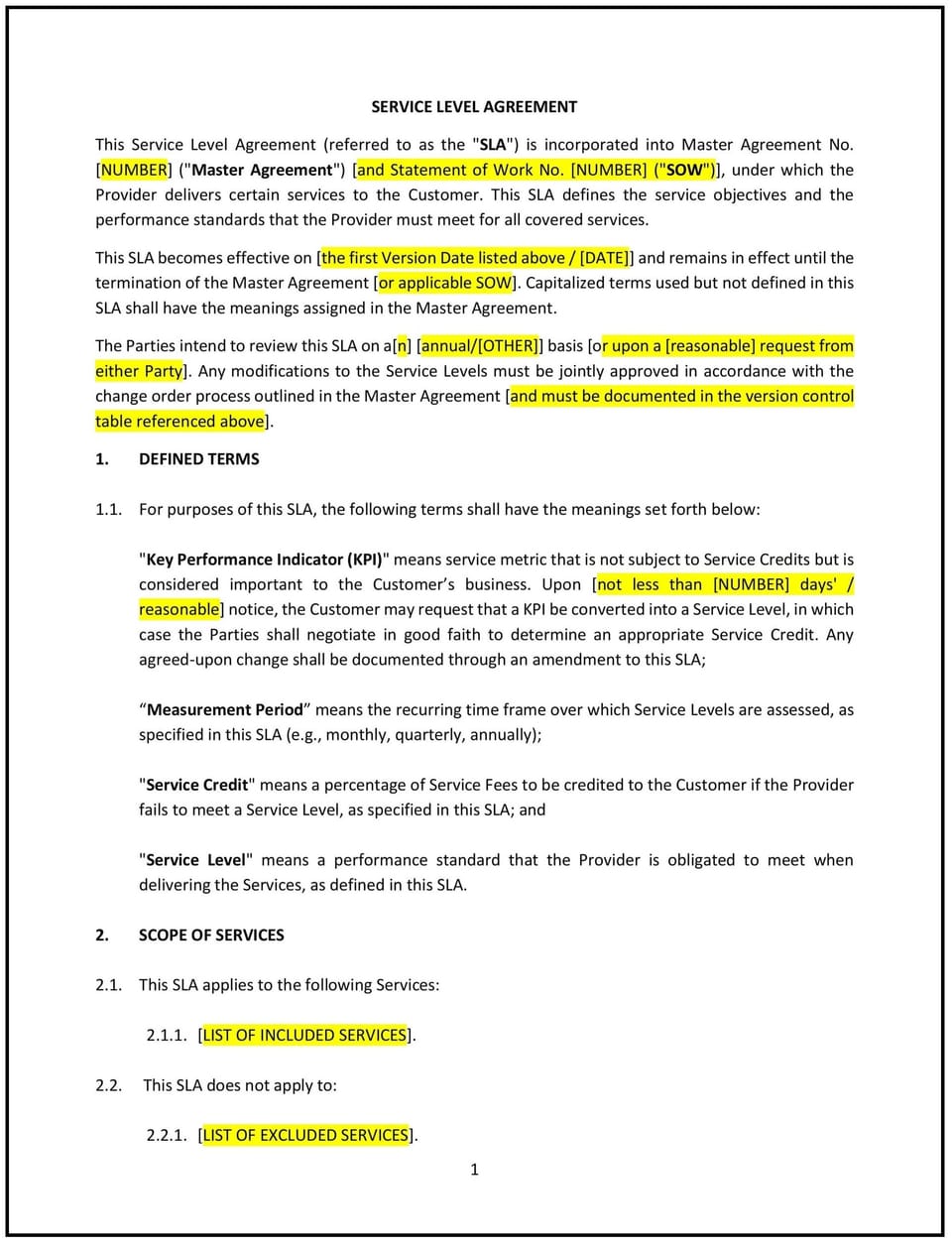Service Level Agreement (SLA) (South Carolina): Free template

Service Level Agreement (SLA) (South Carolina)
A Service Level Agreement (SLA) in South Carolina is a legally enforceable contract that establishes the standards of service delivery, the responsibilities of both parties, and the remedies available if expectations are not met. SLAs are commonly used in IT services, cloud computing, managed service providers, consulting, and maintenance contracts to create a clear framework for service performance and reliability.
In South Carolina, SLAs are governed by general contract law, but companies in regulated sectors such as healthcare, finance, and telecommunications must also adhere to federal and industry-specific compliance requirements. A well-structured SLA protects both the service provider and the client by minimizing disputes, defining accountability, and ensuring uninterrupted business operations.
Tips for drafting and maintaining a Service Level Agreement in South Carolina
- Provide a detailed description of services, including expected deliverables, response times, and measurable performance benchmarks. This prevents ambiguity and sets clear expectations.
- Define key performance indicators (KPIs), such as system uptime percentages, resolution time for technical issues, or scheduled maintenance windows, to track service compliance.
- Specify the client's responsibilities, such as granting access to necessary systems, providing essential data, or ensuring compliance with agreed service requirements.
- Outline remedies for performance failures, such as financial penalties, service credits, or contract renegotiation options. South Carolina law permits flexibility in negotiating these terms.
- Include a dispute resolution clause that establishes whether conflicts will be handled through South Carolina courts, arbitration, or mediation. Many businesses opt for arbitration to expedite resolutions.
- Address data security and confidentiality obligations, particularly for providers handling sensitive customer information. Businesses should ensure they meet federal data protection standards.
- Conduct regular reviews and updates of the SLA to accommodate business growth, technological advancements, and any new legal requirements.
Frequently asked questions (FAQs)
Q: What should South Carolina businesses include in a Service Level Agreement?
A: The agreement should specify the scope of services, performance standards, penalties for non-compliance, client responsibilities, dispute resolution mechanisms, and termination conditions.
Q: How does an SLA help small businesses in South Carolina?
A: An SLA provides clear expectations, ensures service consistency, prevents miscommunication, and gives businesses leverage if service providers fail to meet obligations.
Q: Are service credits enforceable in South Carolina SLAs?
A: Yes, if service credits are explicitly included in the agreement, they are enforceable and can be used as compensation for service failures.
Q: What happens if a service provider does not meet SLA requirements in South Carolina?
A: Depending on the agreement, clients may receive service credits, refunds, or have the right to terminate the contract. If necessary, legal action can be taken for severe breaches.
Q: How should South Carolina businesses handle SLA-related disputes?
A: The SLA should detail a clear dispute resolution process, including options such as mediation, arbitration, or court proceedings in South Carolina.
Q: Can verbal SLAs be enforced in South Carolina?
A: While verbal agreements may be enforceable in some cases, a written SLA offers far greater legal protection and ensures that expectations are clearly documented.
Q: Can an SLA be revised after signing in South Carolina?
A: Yes, modifications require mutual consent and should be properly documented to prevent future misunderstandings.
This article contains general legal information and does not contain legal advice. Cobrief is not a law firm or a substitute for an attorney or law firm. The law is complex and changes often. For legal advice, please ask a lawyer.


